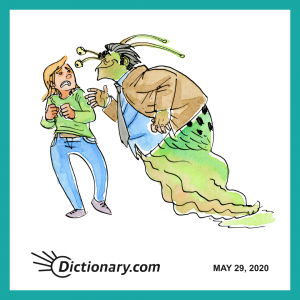Word of the Day
plaintive
adjective
expressing sorrow or melancholy; mournful: a plaintive melody.
More about plaintive
The English adjective plaintive “sorrowful, melancholic” comes from Middle English pleintif (also plaintive, plantif, and plantife), from the Old French adjective plaintif (masculine) and plaintive (feminine) “lamentable.” Plaintif derives from the noun plainte “mourning, lamentation,” and comes from the Medieval Latin noun plancta, from Latin planctus “the sound of a person striking their breast,” from the verb plangere “to beat, strike, mourn, bewail.” Old French plaintif is also the source of English plaintiff “one who brings suit in a court, complainant.” Plaintive entered English in the late 14th century.
how is plaintive used?
A strain of plaintive music, played on stringed instruments and flutes, recalled my attention to the hidden shrine.
Thundercat’s new album feels particularly suited for this moment — filled with both celestial, futuristic escapism and plaintive grief, the strength of human resilience and an unstinting sense of frustration.
plaintive


escapism
noun
the avoidance of reality by absorption of the mind in entertainment or in an imaginative situation, activity, etc.
More about escapism
Escapism, originally an Americanism, is a compound of escape and the suffix –ism, first appearing in 1933.
how is escapism used?
Most of us, when we arrive at a particularly trying moment in life, begin to indulge in escapism.
Not that there’s anything wrong with escapism—until escapism is all you’ve got.
escapism


unctuous
adjective
excessively smooth, suave, or smug.
More about unctuous
Unctuous comes from Medieval Latin unctuōsus, “full of grease or soft fat,” a derivative of Latin unguen. All of the Middle English meanings pertain to grease, oil, or fat. It is only in the 18th century that the sense “marked by spiritual unction or holy oil” developed into the extended sense “smooth, suave, or smug,” the most common meaning of the word today. Unctuous entered English in the 14th century.

how is unctuous used?
Dwight Schrute, when last we left him, was regional manager of Dunder Mifflin Paper Company in Scranton, Pa. … He was vainglorious, unctuous, gullible, humorless, vulnerable, fascistic.
His style, moreover, struck her as being far too unctuous and effusive to be sincere.
unctuous





